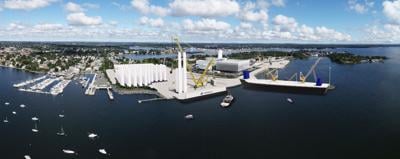A former coal plant turned gas plant is now about to turn to offshore wind?
Same players who are tearing up the Cape plan huge site in Salem, Mass., subsidized, by Massachusetts Taxpayersby
Salem Port Acquisition A “Long Term” Offshore Wind Investment
MassCEC Plans to Buy, Lease Back Port Site

DEC. 27, 2023…..Coming soon to the state’s portfolio: 37-plus acres of harborside land in Salem, envisioned as the second major offshore wind port in Massachusetts.
The quasi-public Massachusetts Clean Energy Center is on the verge of purchasing the port property from Florida-based shipping company Crowley, according to a company official. Crowley will then lease back from the state and operate the facility that could play a key role in the evolution of the offshore wind industry.
Graham Tyson, vice president of operations for Crowley Wind Services, said the transfer of ownership would “ensure that the project is utilized to the best benefit of the state of Massachusetts offshore wind goals.”
“Regardless of what [wind] projects may be awarded and in what sequence, the port can be utilized to meet the state’s targets,” he said. “It also allows them to invest state and federal money into an asset that retains state ownership, so it’s an investment for the long term.”
The development, which the Boston Globe first reported Wednesday, fulfills a plan outlined during the final days of the Baker administration to use $75 million in state funding to convert the former coal-fired power plant into an offshore wind port.
Crowley will receive $30 million for the sale, the same amount the company paid when it originally purchased the land, according to Tyson. Another $45 million in state funding will support capital development at the site.
Another five acres of the site are owned by the city of Salem.
Tyson said the company and MassCEC have a “full agreement on the terms” of the sale and are looking to close the deal in early 2024. Construction work to convert the site’s existing coal plant into an offshore wind terminal will also begin next year and is slated to be done by 2026.
“Massachusetts is on the cutting edge of the American offshore wind industry, in part thanks to our strong port infrastructure operated by the Massachusetts Clean Energy Center,” a MassCEC spokesperson said. “The Salem Port will provide expanded capacity to the region’s growing offshore wind industry and good-paying jobs to our residents. Negotiations are ongoing, and the project is on schedule.”
About eighty to 100 people will work at the facility during construction, Tyson said. Once operations begin, project teams for specific offshore wind installations will move in as tenants of the terminal, bringing about 150 employees at a time, he added.
Avangrid, the energy giant behind the Vineyard Wind 1 project that’s about to become the first in Massachusetts to generate power, will serve as the “anchor tenant” at the new Salem port terminal.
Baker and Healey administration officials have been moving to make the location the second major offshore wind terminal in Massachusetts. MassCEC also already owns and operates the New Bedford Marine Commerce Terminal and the Wind Technology Testing Center in Charlestown, both of which are key offshore wind facilities.
“The major attractor to Salem is the unrestricted access to the port. There’s no bridges or other size restrictions in Salem that would prohibit us from getting in installation vessels or other large vessels,” Tyson said. “The acreage is extremely valuable for the offshore wind industry because a larger site allows you to have a larger store of components and ensure that there’s always components ready to go offshore.”
The terminal could play a key role in the development of new turbine installations, a critical tool to achieving net-zero carbon emissions by 2050. And its location north of Boston could prove beneficial as the federal government moves towards selling offshore wind lease areas in the Gulf of Maine as early as next year.
Policymakers have long viewed offshore wind as a linchpin to their decarbonization efforts, but the industry’s early days have been clouded by uncertainty. Developers backed out of a pair of project commitments — including Avangrid’s separate Commonwealth Wind proposal — because of what they described as changing economic circumstances, cutting the amount of wind power in the pipeline by three-quarters.


Scammers Gonna Scam and screw taxpayers and ratepayers in the process. So-called man-made ‘Global Warming’/’Climate Change’ is a HOAX. CO2 is plant food.
SEE 2022 Report of Professors Happer and Lindzen to the SEC:
https://co2coalition.org/wp-content/uploads/2022/06/Happer-Lindzen-SEC-6-17-22.pdf